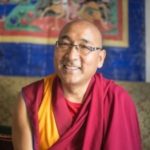Teachings with Geshe Sherab
The Role of Vows on the Path
A vow is a promise that—when kept—upholds virtue and creates trustworthiness. When we keep vows, we refrain from committing harmful actions that result in an unsettled mind. We also demonstrate to others that we intend to follow through on our commitments. As a result of holding steady to our positive intentions, self-confidence develops. In Buddhism, there are many different kinds of vows that a practitioner might take. But how does taking vows work? If you already live a virtuous life, what is the purpose of taking vows? What constitutes breaking a vow?
Join us for a Friday (3/20/2020) evening teaching from Geshe Sherab about the role of all types of vows on the spiritual path.
The Bodhisattva Vows
Bodhisattvas are beings who are driven by their deep compassion to attain enlightenment, the fully developed state in which one can benefit other beings most effectively. We can all get closer to this excellent state! A powerful method for developing this enlightened mind is taking the bodhisattva vows. Geshe Sherab will guide us through these 18 root vows and 46 branch vows, which were designed to hold the mind in its most loving stance—one of supreme ethics and compassion for others.
You can find the text for this teaching here.
Viewing Current Events Through a Dharma Lens
Obsession, anger, avoidance—do any of these describe your reaction to current events? From the climate emergency to political polarization and global tension, there are so many concerning issues that are part of our shared reality. How do we relate to and understand, let alone engage with, what’s happening? Fortunately, Buddhist teachings can aid us in challenging times, starting with working with our own perceptions. Geshe Sherab will show us how we can reframe and deal with current events skillfully using Dharma teachings.
About the Teacher
 Geshe Thubten Sherab was born in 1967 in a small village in the province of Manang, the western part of Nepal, to a Kagyu-Nyingma family. He entered Kopan Monastery at the age of nine and completed his geshe studies at Sera Jey monastery in South India, followed by a year at Gyumed Tantric College. He then completed retreat and teaching assignments in the United States and Asia. Geshe Sherab served as headmaster of Kopan Monastery’s school for four years, overseeing debate training and tantric training activities. Geshe-la taught and helped in the FPMT International Office for two and a half years in Taos, New Mexico (2001–03) and also served as director of the FPMT board for a few years. For the last few years, Geshe-la has been traveling and teaching at FPMT centers in the United States, Canada, Mexico, Asia, and Europe, while also serving as resident teacher at Thubten Norbu Ling in Santa Fe, New Mexico.
Geshe Thubten Sherab was born in 1967 in a small village in the province of Manang, the western part of Nepal, to a Kagyu-Nyingma family. He entered Kopan Monastery at the age of nine and completed his geshe studies at Sera Jey monastery in South India, followed by a year at Gyumed Tantric College. He then completed retreat and teaching assignments in the United States and Asia. Geshe Sherab served as headmaster of Kopan Monastery’s school for four years, overseeing debate training and tantric training activities. Geshe-la taught and helped in the FPMT International Office for two and a half years in Taos, New Mexico (2001–03) and also served as director of the FPMT board for a few years. For the last few years, Geshe-la has been traveling and teaching at FPMT centers in the United States, Canada, Mexico, Asia, and Europe, while also serving as resident teacher at Thubten Norbu Ling in Santa Fe, New Mexico.


